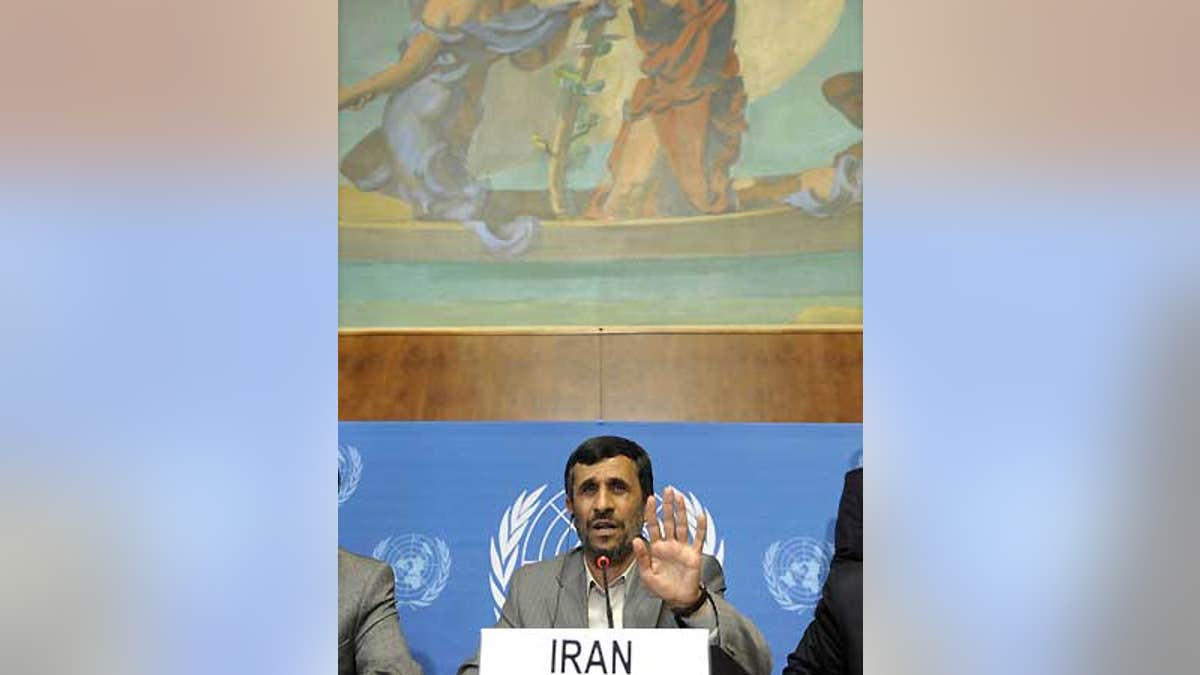
April 20: Iranian President Mahmoud Ahmadinejad speaks during a press conference at the U.N.'s Conference against Racism in Geneva. (AP)
GENEVA – Over 100 countries agreed Tuesday on a declaration to combat racism and related forms of intolerance worldwide, but the United States was not among them.
The 143-point declaration includes a warning against stereotyping people because of their religion, a key demand of Islamic states who say Muslims have been unfairly targeted for their beliefs since the Sept. 11, 2001, terrorist attacks in New York and Washington, D.C.
The declaration reaffirms principles agreed to at the U.N.'s first global racism meeting eight years ago in Durban, South Africa, when the U.S. and Israel walked out because many participants used the forum as an opportunity to attack the Jewish state over its Palestinian policy.
Israel is not mentioned anywhere in the declaration passed Tuesday, which seeks to avoid any offense but has angered many in the Muslim world for its failure to point the finger directly at the Jewish state for its treatment of Palestinians.
The U.S. and Israel also boycotted this week's meeting in Geneva over fears it would repeat anti-Israel outbursts.
Canada, Germany, Italy, Poland, Australia, New Zealand and the Netherlands also stayed away from the conference.
The fear that the conference would turn into a forum to attack Israel and the U.S. was realized Monday when Iranian President Mahmoud Ahmadinejad called the Jewish state the "most cruel and repressive racist regime."
But as incendiary as Ahmadinejad's speech was, a U.N. official on Tuesday said the Iranian leader dropped language describing the Holocaust as "ambiguous and dubious."
The U.N. and the Iranian Mission in Geneva did not comment on why the change was made, but U.N. Secretary-General Ban Ki-moon said Monday that he had met with Ahmadinejad before his speech and reminded him that the U.N. had adopted resolutions "to revoke the equation of Zionism with racism and to reaffirm the historical facts of the Holocaust."
Ahmadinejad's accusation that the West used the Holocaust as a "pretext" for aggression against Palestinians still provoked walkouts by a stream of delegates including representatives of all 23 European Union countries in attendance. But others, including those from the Vatican, stayed in the room because they said he stopped short of denying the Holocaust.
All but one of the EU countries — the Czech Republic — later rejoined the conference and approved the declaration.
The walkout Monday came after Ahmadinejad accused Western nations of complicity in violence against Palestinians surrounding the foundation of Israel.
The original text of his speech said, "Following World War II, they resorted to military aggression to make an entire nation homeless on the pretext of Jewish sufferings and the ambiguous and dubious question of Holocaust."
U.N. spokeswoman Marie Heuze said that U.N. officials had checked back with the interpreters and the Farsi recording of Ahmadinejad's speech, and determined that the Iranian president had dropped the terms "ambiguous and dubious," referring instead in Farsi to "the abuse of the question of the Holocaust."
The U.S. boycott, meanwhile, did not sit well with the executive director of the Atlanta-based U.S. Human Rights Network.
"We believe that the issue of Israel was always a pretext," said Ajamu Baraka, whose group has in the past said the U.S. is ignoring persistent racial disparities at home. He said issues such as possible reparations for the effects of the trans-Atlantic slave trade appear to have contributed to the U.S. decision to stay away.
Officials at the U.S. mission in Geneva declined to comment.
"The boycott of the Obama administration both saddens us and angers us," said Jaribu Hill, executive director of the Mississippi Workers' Center for Human Rights.
"We will not let Mr. Obama off the hook simply because he stands inside black skin, or because his campaign served to energize and inspire thousands of young people and people of color, and those who have historically been locked out," she said.
Ejim Dike of the New York-based Urban Justice Center said by staying away, Obama had missed an opportunity to challenge Iranian President Mahmoud Ahmadinejad over his views on Israel.
In Tehran, meanwhile, around 200 people gathered at the airport to give Ahmadinejad a hero's welcome., welcoming him with bunches of flowers.
State TV described him as having defended Palestinian rights against a racist regime. The official IRNA news agency, which strongly supports Ahmadinejad, quoted lawmaker Mohammad Reza Bahonar as saying that Ahmadinejad's speech in Geneva was a "great achievement for the (Iran's ruling) system."
Iran's state television also said Tuesday that the parliament speaker has warned Israel against a possible attack on the country's nuclear facilities.
The Associated Press contributed to this report.
